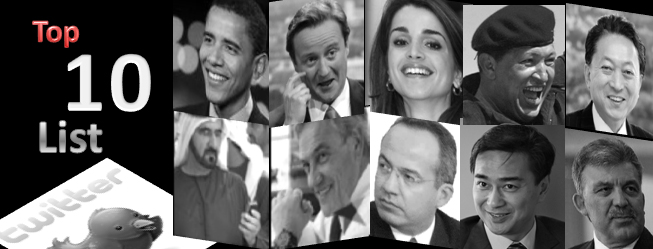Digital Policy Council Tracks An Open Government Movement Around The Globe

The Digital Policy Council latest research investigates the impact of new media technologies to advance good governance and reshape political discourse.
Washington, D.C. October 17, 2010 – The Digital Policy Council (DPC), an international, non-partisan “think tank” on 21st Century Governance, has released updated rankings on the use of social media by heads of state.
The DPC is the research and public advocacy arm of Digital Daya (‘digital influence’), a new generation strategic consultancy that empowers leaders in the public sectors to leverage the new media of the Internet to communicate their message, build public influence, and execute high-impact programs to reshape governance and public policy.
According to The Digital Policy Council’s most up-to-date research, more and more world leaders are turning to social media to remodel the way in which governments in the 21st Century govern and communicate. As it stands today 20% or one out of five heads of state are now on the social media site Twitter. This represents a 50% increase in the number of countries from when the DPC first began tracking these metrics at the beginning of 2010.
“Governments are preparing for a digital society. Direct communication with citizens is now becoming an expectation of heads of state,” said Omar Hijazi, Managing Partner at Digital Daya. “It is part of an escalating transformation in how we interact with our governments. Social media, cloud computing, web and mobile technologies are providing new capabilities to government officials for public engagement and equally new accountabilities.”
The Movement Towards Open Government
The idea of governments to openly engage their citizens and the global community directly was brought to the forefront on December 8, 2009, when the White House issued an open government directive. President Obama signed into effect a commitment of his administration to create an unprecedented level of openness in government and to harness digital technology to drive a radical reshaping of government. Over the course of the year, the governments of the U.K., Australia, and Japan followed suit with similar policy actions.
The net effect of these directives was to declare information maintained by federal governments a national asset to be made accessible online to the public, to empower public service officials to involve citizens directly in policymaking, and to stage government-owned technology as platforms, or foundations, for the private sector to build upon and co-create solutions to national challenges.
The simple concept behind all these initiatives is good governance; that the adoption of Internet technologies can drive considerable efficiency and innovation to the practice of government.
A Global Phenomenon
The Digital Policy Council’s research reaffirms that this culture of open political discourse is spreading across the globe as more world leaders seek direct communication with their citizenry. In fact, the top 10 global ranking includes only two nations from the West and has changed dramatically since the beginning of the year with four new entrants including Venezuela, Mexico, Thailand and Turkey.
Most notable on the new list is President Hugo Chavez of Venezuela, who joined Twitter in April explaining that “This isn’t capitalist or socialist, technology depends on how you use it.” The President quipped that his account be placed in bucket of ice to cool off – aptly so as his followers are now nearing one million to place him at the #4 spot globally. The outspoken Latin leader is not alone in the top 10 as he is joined by the populist President Sebastián Piñera of Chile and President Felipe Calderón of Mexico each with a quarter million followers.
In the East, Prime Minister Yukio Hatoyama of Japan appears committed to a citizen-centric approach amassing over 700,000 followers on his Twitter account.
Towards the Gulf, it is the UAE Vice President, Prime Minister and Ruler of Dubai His Highness Sheikh Mohammed bin Rashid Al Maktoum who leads with open direct communication with his citizens and residents. Holding the first e-session with the public on the Prime Minister’s official website, he stressed that “Such an attachment between leadership and people is one of the most distinguishing characteristics of the UAE.”
Stability Remains The Determining Factor
It is interesting to note that the DPC’s analyses shows that 95% of the countries on the list are considered politically stable reconfirming that leaders who are confident in their leadership role and assured of their political legitimacy are most comfortable with social media regardless of the form of government whether they serve in democracies, autocracies or monarchies. The political leadership of most fragile nations, those with a high degree of political instability, continue to view social media as a threat and adoption remains low.
The exception is Africa’s new champion of social media in the form of President Goodluck Jonathan of the Federal Republic of Nigeria. The President of Africa’s most populous nation has aggressively embraced social media to the point where he announced on Facebook his controversial decision to stand for upcoming January 2011 presidential elections. “It’s a small platform perhaps, but it offers the possibility of change.” justified President Goodluck.
The DPC analyses does however provide a note of caution to the pioneers of open government in stable democracies. While President Obama retains the top spot with a vast 5.6 million followers, his Twitter account communication is often criticized as overly sanitized as it is being managed by his political party. Despite calls from his own conservative party for a “big hitter on Twitter”, U.K. Prime Minister David Cameron does not personally tweet and the 10 Downing Street Twitter following has remained relatively static since the changeover in administration. Australian Prime Minister Julia Gillard’s following of 60,000 on Twitter pales in comparison to the nearly one million amassed by her predecessor Kevin Rudd.
Citizen-centric governance is founded on engagement and discourse not around yet another broadcast media channel. The Digital Policy Council urges government leaders in all countries not to lose sight of how greatly the fast-evolving power of the Internet is driving the desire for inclusive governance. As Google’s CEO Eric Schmidt noted at the recent Washington Ideas Forum “Technology is fundamentally disruptive, and people are always shocked at how real disruption occurs.” Schmidt explained, “We’re at a point now in technology where we really can change the entire political discourse if we want to.”
For more information download the report at www.digitaldaya.com/world_leaders_on_twitter
About The Digital Policy Council™
The Digital Policy Council (DPC) is an international, non-partisan ‘think tank’ that promotes good governance and policy-making. The research and policy arm of the management consultancy firm Digital Daya™, DPC’s mission is the advancement of open discourse on issues of inclusive governance through the use of the Internet and Web 2.0.
Contact:
The Digital Policy Council
http://www.digitaldaya.com/
U.S. +1-202-379-4787
UAE +971-4-313-2086
Malaysia +60-3-2168-4201
Email: public_relations@digitaldaya.com

